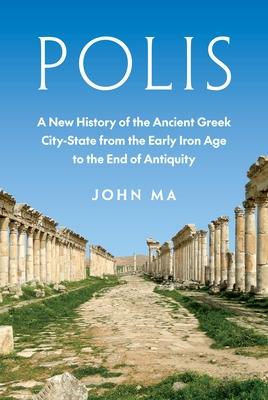A definitive new history of the origins, evolution, and scope of the ancient Greek city-state
The Greek polis, or city-state, was a resilient and adaptable political institution founded on the principles of citizenship, freedom, and equality. Emerging around 650 BCE and enduring to 350 CE, it offered a means for collaboration among fellow city-states and social bargaining between a community and its elites--but at what cost? Polis proposes a panoramic account of the ancient Greek city-state, its diverse forms, and enduring characteristics over the span of a millennium. In this landmark book, John Ma provides a new history of the polis, charting its spread and development into a common denominator for hundreds of communities from the Black Sea to North Africa and from the Near East to Italy. He explores its remarkable achievements as a political form offering community, autonomy, prosperity, public goods, and spaces of social justice for its members. He also reminds us that behind the successes of civic ideology and institutions lie entanglements with domination, empire, and enslavement. Ma's sweeping and multifaceted narrative draws widely on a rich store of historical evidence while weighing in on lively scholarly debates and offering new readings of Aristotle as the great theoretician of the polis. A monumental work of scholarship, Polis transforms our understanding of antiquity while challenging us to grapple with the moral legacy of an idea whose very success centered on the inclusion of some and the exclusion of others.
Book
Polis: A New History of the Ancient Greek City-State from the Early Iron Age to the End of Antiquity
by John Ma
(Write a Review)
Hardcover
$55.50
A definitive new history of the origins, evolution, and scope of the ancient Greek city-state
The Greek polis, or city-state, was a resilient and adaptable political institution founded on the principles of citizenship, freedom, and equality. Emerging around 650 BCE and enduring to 350 CE, it offered a means for collaboration among fellow city-states and social bargaining between a community and its elites--but at what cost? Polis proposes a panoramic account of the ancient Greek city-state, its diverse forms, and enduring characteristics over the span of a millennium. In this landmark book, John Ma provides a new history of the polis, charting its spread and development into a common denominator for hundreds of communities from the Black Sea to North Africa and from the Near East to Italy. He explores its remarkable achievements as a political form offering community, autonomy, prosperity, public goods, and spaces of social justice for its members. He also reminds us that behind the successes of civic ideology and institutions lie entanglements with domination, empire, and enslavement. Ma's sweeping and multifaceted narrative draws widely on a rich store of historical evidence while weighing in on lively scholarly debates and offering new readings of Aristotle as the great theoretician of the polis. A monumental work of scholarship, Polis transforms our understanding of antiquity while challenging us to grapple with the moral legacy of an idea whose very success centered on the inclusion of some and the exclusion of others.Hardcover
$55.50